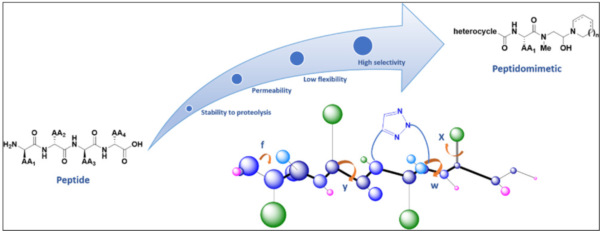A peptidomimetic library is a collection of small molecule compounds designed to mimic the structural and functional properties of peptides while overcoming their limitations. Peptidomimetics are synthetic molecules that possess non-peptide backbones but retain peptide-like features, such as molecular shape and chemical motifs. The peptidomimetic library consists of diverse chemical compounds that mimic the interactions of peptides with target proteins, providing a valuable resource for drug discovery and therapeutic development.
Peptides have long been recognized as potential therapeutics due to their ability to interact with protein targets and modulate biological processes. However, peptides often suffer from limitations such as poor metabolic stability, limited bioavailability, and vulnerability to proteolytic degradation. Peptidomimetics are designed to retain the beneficial properties of peptides, such as target specificity and binding affinity, while addressing these limitations and offering additional advantages.
The peptidomimetic library encompasses a wide range of chemical structures that have been optimized and designed using various strategies, including rational drug design, combinatorial chemistry, and high-throughput screening. The compounds in the library are typically synthesized using organic chemistry techniques and diversified through modifications to the backbone, side chains, or other regions, allowing for structural diversity and functional modifications.
The library may consist of different types of peptidomimetics, including scaffolds such as β-turn mimics, peptoid-based compounds, macrocycles, cyclic peptides, and other non-peptide molecular frameworks. These peptidomimetics can be further optimized through iterative structure-based design and medicinal chemistry approaches to enhance their binding affinity, selectivity, metabolic stability, and pharmacokinetic properties.
The peptidomimetic library is often accompanied by tools for compound screening and optimization. These include high-throughput screening assays, computational tools for virtual screening, molecular modeling, and structure-based drug design. These resources facilitate the identification and optimization of lead compounds with desirable properties, increasing the chances of success in drug discovery programs.
Peptidomimetics have broad applications in drug discovery and therapeutic development. They provide an alternative to peptides by offering enhanced properties such as improved metabolic stability, oral bioavailability, and cell permeability. Peptidomimetics can modulate protein-protein interactions (PPIs), enzyme activity, receptor signaling, and other biological processes. They have shown promise in various therapeutic areas, including cancer, infectious diseases, inflammation, and neurological disorders.
The advantages of peptidomimetics include higher chemical diversity, reduced immunogenicity, potential for oral administration, and easier synthesis compared to peptides. Additionally, peptidomimetics allow for the integration of additional functionalities, such as fluorescent labels or drug delivery moieties, which can further enhance their therapeutic potential.
Despite these advantages, designing and optimizing peptidomimetics can be challenging. Achieving the desired balance between structural mimicry and selectivity presents a significant hurdle. Each target protein and peptide interaction may require specific modifications, and fine-tuning the properties of peptidomimetics often requires optimization through systematic structure-activity relationship studies and medicinal chemistry approaches.
In conclusion, a peptidomimetic library is a valuable resource for researchers in the field of drug discovery. It consists of a collection of small molecules designed to mimic peptides while addressing their limitations. The library offers diverse chemical compounds that can modulate protein-protein interactions, enzyme activity, and receptor signaling, with the potential for therapeutic development in various disease areas. Peptidomimetics provide a versatile platform to explore novel targets and develop innovative therapeutics with improved properties for precision medicine.




